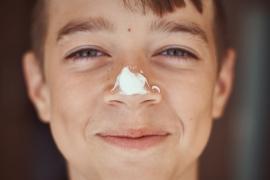This past spring break, Pam and I took our ten-year-old son, Daniel, to Washington, DC. Daniel is really enjoying his US history studies at school, and we knew this would be an ideal time to explore the many historical exhibits and museums our nation's capital has to offer. Daniel was particularly excited about the exhibits within the National Archives Building, and we visited them multiple times. Sculptor Robert Aitken's 1935 statue "Future" sits in front of the National Archives Building. The inscription beneath the statue, "What is past is prologue," is a quote from William Shakespeare in his play, The Tempest. I really enjoyed ruminating about this quote, as it reminds us that history sets the context for the present. This is particularly true in the field of American camp.
One only has to read Lance Ozier, EdD's, wonderful Camping Magazine article "Camp as Educator: Lessons Learned From History" or Leslie Paris' book, Children's Nature: The Rise of American Summer Camp (NYU Press, 2008) to be reminded that camp programs have always been exceptional learning environments. So many pioneering American camp directors were also widely respected traditional educators. Universities and the popular press in the early 20th century regularly praised the virtues of camp education.
Today, 157 years after educator Frederick Gunn founded what is believed to be America's first camp program in 1861, the unique learning contexts of camp programs are considered more educationally essential than ever before for children, youth, and adults as skills-based, social-emotional learning communities. Camp offers staff and campers alike the opportunity to become more self-reflective, developing resiliency and confidence. In nature, campers and staff learn to relate to others from diverse backgrounds and communicate more humanly, undistracted by technology. Together, young people at camp are encouraged to take positive risks, learn from mistakes, and try again. In these empathy-infused ecosystems of curiosity, campers collaborate on projects that engage critical-thinking skills, communication skills, and creativity in a communal environment where altruism and contribution are celebrated.
A growing amount of research celebrates the value of camp experiences because of their small group structure, caring staff, communal living, and activities that teach relationship skills, appreciation for diversity, and joyful curiosity. With Generation Z growing up with fewer in-person social experiences in favor of digital relationships and experiencing increased loneliness, depression, and emotional health challenges, it is as if the preceding 150 years of camp has led us to this pivotal time when camp and other out-of-school time programs are recognized as fundamental and quintessential to the successful education of every American child who hopes to compete in tomorrow's global, human-skills-centered economy.
Our time is now! Today, the American Camp Association needs the philanthropic support of every champion, funder, and constituent of camp so we can extend our research efforts and communicate an even more compelling longitudinal story about the impacts of camp. We must be able to invest in far-reaching publicity campaigns to promote credible research findings from camp experiences, the brand, and necessity of camp to diverse American audiences. We must continue to build our advocacy in Washington, DC, so we can protect camp cultural exchange experiences and argue for funding for camp experiential education for every young person.
Please give generously to ACA's Annual Fund today. Camp has never been more critical to the education and well-being of children, youth, and adults. Your tax-deductible, charitable gift in support of ACA's Annual Fund is critical to the future of experiential education for American youth. Thank you so much for your kind and generous support!

